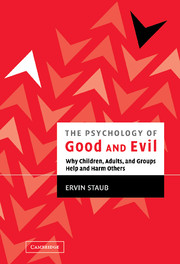Book contents
- Frontmatter
- Contents
- Preface
- Acknowledgments
- PART I INTRODUCTION AND CORE CONCEPTS
- PART II THE ROOTS OF HELPING OTHER PEOPLE IN NEED IN CONTRAST TO PASSIVITY
- PART III HOW CHILDREN BECOME CARING AND HELPFUL RATHER THAN HOSTILE AND AGGRESSIVE
- PART IV THE ORIGINS OF GENOCIDE, MASS KILLING, AND OTHER COLLECTIVE VIOLENCE
- PART V THE AFTERMATH OF MASS VIOLENCE: TRAUMA, HEALING, PREVENTION, AND RECONCILIATION
- PART VI CREATING CARING, MORALLY INCLUSIVE, PEACEFUL SOCIETIES
- 44 Changing Cultures and Society
- 45 Transforming the Bystanders: Altruism, Caring, and Social Responsibility
- 46 Blind versus Constructive Patriotism: Moving from Embeddedness in the Group to Critical Loyalty and Action
- 47 Manifestations of Blind and Constructive Patriotism: Summary of Findings
- 48 The Ideal University in the Real World
- 49 Conclusion: Creating Caring Societies
- Appendix: What Are Your Values and Goals?
- Index
49 - Conclusion: Creating Caring Societies
Published online by Cambridge University Press: 07 May 2010
- Frontmatter
- Contents
- Preface
- Acknowledgments
- PART I INTRODUCTION AND CORE CONCEPTS
- PART II THE ROOTS OF HELPING OTHER PEOPLE IN NEED IN CONTRAST TO PASSIVITY
- PART III HOW CHILDREN BECOME CARING AND HELPFUL RATHER THAN HOSTILE AND AGGRESSIVE
- PART IV THE ORIGINS OF GENOCIDE, MASS KILLING, AND OTHER COLLECTIVE VIOLENCE
- PART V THE AFTERMATH OF MASS VIOLENCE: TRAUMA, HEALING, PREVENTION, AND RECONCILIATION
- PART VI CREATING CARING, MORALLY INCLUSIVE, PEACEFUL SOCIETIES
- 44 Changing Cultures and Society
- 45 Transforming the Bystanders: Altruism, Caring, and Social Responsibility
- 46 Blind versus Constructive Patriotism: Moving from Embeddedness in the Group to Critical Loyalty and Action
- 47 Manifestations of Blind and Constructive Patriotism: Summary of Findings
- 48 The Ideal University in the Real World
- 49 Conclusion: Creating Caring Societies
- Appendix: What Are Your Values and Goals?
- Index
Summary
conclusions: building blocks of goodness in individuals and societies
In concluding the book, I will add some thoughts about what is required for individuals and groups, including nations, to not act violently, but instead to care about and promote others' welfare. What are the cultural, social, and psychological requirements for a peaceful world that nourishes the human spirit and helps individuals develop their personal and human potentials? Along the way I will comment further on influences leading to violence and make some reference to the evolution of terrorism.
basic human needs
This book has identified many influences that lead to helping or harm-doing. A basic needs perspective can help us to go beyond those influences, to give a sense of wholeness and coherence to our understanding of the roots of evil and goodness, and to point to ways that we can generate goodness.
To briefly summarize, human beings have fundamental, shared needs. These include a need for security, for a positive identity, for a sense of effectiveness, for both positive connection to other people and autonomy, for a comprehension of reality. Another need, which emerges most strongly when the needs I have described are reasonably satisfied, is the need for transcendence. This is an aspect of spirituality – the need to go beyond one's own material concerns and beyond the self. When these needs are fulfilled, people are well on their way to harmonious, caring relationships with others, as well as continued growth in their lives.
- Type
- Chapter
- Information
- The Psychology of Good and EvilWhy Children, Adults, and Groups Help and Harm Others, pp. 531 - 550Publisher: Cambridge University PressPrint publication year: 2003
- 2
- Cited by



